外研版九年级英语上册学案 Module2 Unit1
Module2Unit1外研版英语九年级上册教案详解

(三)实践活动(用时10分钟)
1.分组讨论:学生们将分成若干小组,每组讨论一个喜欢的西方音乐类型,并探讨这种音乐给他们的感受。
2.实验操作:为了加深理解,我们将进行一个简单的音乐欣赏活动。通过聆听不同类型的音乐,学生尝试用现在进行时态描述音乐的特点。
(二)新课讲授(用时10分钟)
1.理论介绍:首先,我们要了解西方音乐的基本概念。西方音乐有着丰富的类型,如古典、爵士、蓝调等。每种音乐都有其独特的风格和表达的情感。了解和欣赏西方音乐是拓宽我们文化视野的重要途径。
2.案例分析:接下来,我们来看一个具体的案例。这个案例展示了爵士乐的特点和它在放松心情方面的应用。
举例:通过音乐表演和实时描述,让学生感受并运用现在进行时态。
(4)阅读理解:理解课文内容,提取关键信息,提高阅读技能。
举例:设计问题链,引导学生逐步深入理解课文,提取音乐类型、乐器、音乐感受等关键信息。
2.教学难点
(1)词汇的准确运用:学生在使用新学词汇时可能会出现搭配不当或语境误用的情况。
突破方法:通过例句展示、同义词对比和词汇游戏等方式,加强学生对词汇用法的理解。
突破方法:引入相关的文化背景知识,通过视频、讨论等形式,增强学生对西方音乐文化的认识和理解。
四、教学流程
(一)导入新课(用时5分钟)
同学们,今天我们将要学习的是《Module 2 Unit 1外研版英语九年级上册》的"Western music"这一章节。在开始之前,我想先问大家一个问题:“你们在日常生活中喜欢听什么类型的音乐?”这个问题与我们将要学习的内容密切相关。通过这个问题,我希望能够引起大家对音乐类型的兴趣和好奇心,让我们一同探索西方音乐的奥秘。
外研版九年级英语上册教案M1U2第一课时

外研版九年级英语上册教案 M1U2第一课时一、教学内容本节课选自外研版九年级英语上册第一模块(Module 1)第二单元(Unit 2),内容包括:重点词汇、语法、阅读理解以及听说训练。
具体章节为M1U2 Reading: A visit from a pen pal。
二、教学目标1. 让学生掌握本节课的重点词汇和短语,如:teenager, at the age of, grow up等,并能灵活运用。
2. 培养学生运用一般过去时描述过去发生的事情的能力。
3. 提高学生的阅读理解能力,通过阅读了解国外同龄人的生活。
三、教学难点与重点1. 教学重点:一般过去时的用法及重点词汇的掌握。
2. 教学难点:一般过去时的疑问句和否定句的构成。
四、教具与学具准备1. 教具:PPT、黑板、录音机。
2. 学具:课本、练习本、词汇卡片。
五、教学过程1. 导入:通过一个关于笔友的实践情景引入,让学生分享自己与笔友的故事,激发学生的学习兴趣。
2. 阅读前:引导学生预测文章内容,通过提问方式引导学生关注一般过去时。
3. 阅读中:让学生阅读文章,完成相关练习,讲解重点词汇和语法。
4. 阅读后:进行例题讲解,随堂练习,巩固所学知识。
a. 例题讲解:分析文章中的一般过去时的句子,解释其用法。
b. 随堂练习:让学生运用一般过去时完成句子。
5. 口语练习:分组讨论,让学生用一般过去时描述自己的过去经历。
六、板书设计1. 重点词汇:teenager, at the age of, grow up等。
2. 一般过去时的句子结构:主语 + 动词过去式 + 其他。
七、作业设计1. 作业题目:请运用一般过去时描述你上周六的一天。
2. 答案示例:Last Saturday, I got up at 7:00 am. Then I had breakfast and went to the park with my family. We played games and had a picnic. In the afternoon, I visited my grandparents. It was a wonderful day.八、课后反思及拓展延伸2. 拓展延伸:鼓励学生课后了解其他国家的文化,与笔友进行更多交流,提高英语实际运用能力。
Module2Unit1同步教案外研版英语九年级上册
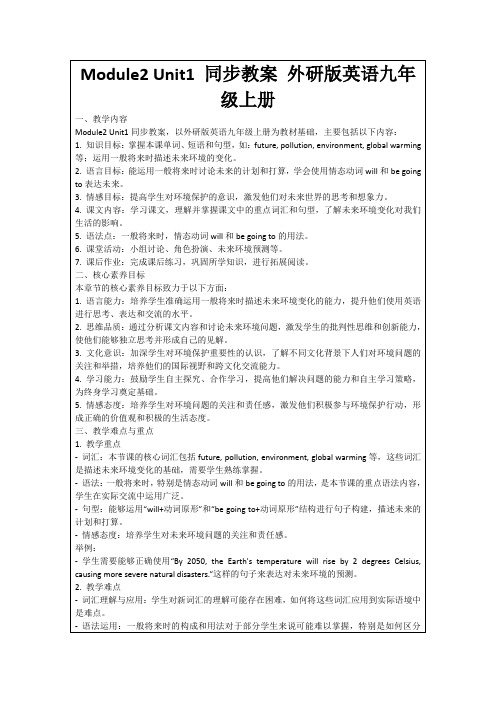
4.学习能力:鼓励学生自主探究、合作学习,提高他们解决问题的能力和自主学习策略,为终身学习奠定基础。
5.情感态度:培养学生对环境问题的关注和责任感,激发他们积极参与环境保护行动,形成正确的价值观和积极的生活态度。
-句型:能够运用“will+动词原形”和“be going to+动词原形”结构进行句子构建,描述未来的计划和打算。
-情感态度:培养学生对未来环境问题的关注和责任感。
举例:
-学生需要能够正确使用“By 2050, the Earth's temperature will rise by 2 degrees Celsius, causing more severe natural disasters.”这样的句子来表达对未来环境的预测。
具体难点内容:
-词汇应用:例如,学生可能知道“pollution”的意思,但在具体描述环境污染的影响时,可能不知道如何运用。
-语法区分:解释何时使用“will”表示突发或未计划的未来事件,何时使用“be going to”表示计划或打算做的事情。
-情感认同:通过讨论和角色扮演等活动,帮助学生理解环境问题的紧迫性,并激发他们的情感共鸣。
在新课讲授环节,我发现理论介绍部分,学生们对一般将来时的理解和掌握程度较好。但在案例分析环节,有些学生在将一般将来时应用到具体情境中时遇到了困难。这让我意识到,在今后的教学中,需要更多地设计一些实际情境,让学生在实践中掌握语法知识。
实践活动环节,分组讨论和角色扮演活动让学生们积极参与,课堂氛围十分活跃。但我也观察到,有些小组在讨论过程中,个别成员参与度不高。针对这个问题,我计划在下次活动中,更加关注每个学生的参与情况,鼓励他们积极投入到小组讨论中。
外研版英语九年级上册模块2.Unit1 听说课课教案
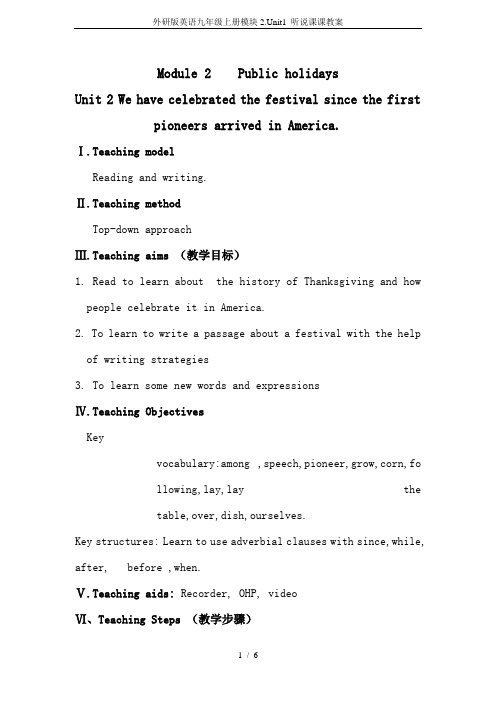
Module 2 Public holidaysUnit 2 We have celebrated the festival since the firstpioneers arrived in America. Ⅰ.Teaching modelReading and writing.Ⅱ.Teaching methodTop-down approachⅢ.Teaching aims (教学目标)1. Read to learn about the history of Thanksgiving and how people celebrate it in America.2. To learn to write a passage about a festival with the helpof writing strategies3. To learn some new words and expressionsⅣ.Teaching ObjectivesKeyvocabulary:among ,speech,pioneer,grow,corn,following,lay,lay thetable,over,dish,ourselves.Key structures: Learn to use adverbial clauses with since,while, after, before ,when.Ⅴ.Teaching aids: Recorder, OHP, videoⅥ、Teaching Steps (教学步骤)Ⅰ.Leading in . (情境导入)Step 1 .Warming-up(Ⅰ情境导入--1.师友对话)1. Review the words and phrases of Unit 1.2. Introduce the new words.(师傅学友明确学习任务:师傅注意纠正学友的发音)Step 2. Complete the sentences.(Ⅰ情境导入--1.师友对话)Look at the picture and talk about it(Activity1)(Ⅰ情境导入--1.教师导入)Ⅱ.Reading comprehension(阅读理解)Step 3. Reading.(Ⅱ阅读理解--1.师友阅读)友情提示:师友独立完成任务,再互助交流Task 1 Read and answer1. Play the recording.2. Ask the students to read through the passage.3.Read the passage and match the headings with the paragraphs.(Activity2)3. Read the passage and complete the table.(Activity3)4. Check with a partner.5. Call back the answers from the whole class.6. Read the text together.(Ⅱ阅读理解--1.师友朗读)友情提示:请朗读,师傅注意学友的语音语调.Task 2 Complete the passage with the correct form of the words and expressions from the box.(Activity4)7. Learning to learn.(Ⅱ阅读理解--2.教师点拨)教师引导学生找出课文中重点短语和句子。
外研版九年级英语上册教案 Module1 Unit2 (1)

多媒体课件
教 学 过 程
二次设计
Step 1
Warming
up and
leading in.
(Act. 1)
1. Ask the students to work in pairs and talk about a great wonder.
2. Show the following questions on the screen.
5. I didn’t r_______long in that city. I came back after two days.
Ⅱ.用所给词的适当形式填空
1. Why did you keep_______(silence) at the meeting? Didn’t you have anything to say?
3. Try to find passages with facts to read.
教学反思
本节课的教学设计, 抓住学生的好奇心理, 活化我们的英语教材, 透过扩展教材资料或活动步骤, 充分激发他们勤于思考、敢于创新的兴趣, 鼓励他们多角度、多方向、新颖独特的提出问题、解决问题; 提倡一题多议, 敢破常规, 使教学向纵深发展。其次, 抓住了阅读技巧, 课堂教学方明确向, 加强学生实际练习、多运用, 确立以“知识理解型”教学模式向“思维训练型”教学模式的转变。
⑤Far below me, the ground fell away and down to a river.
教学难点
1. Get the key information quickly from the reading material.
2. Know how to write about what you see and your feeling when you travel.
外研版九年级英语上册教案Module 2 Unit 1(外研)
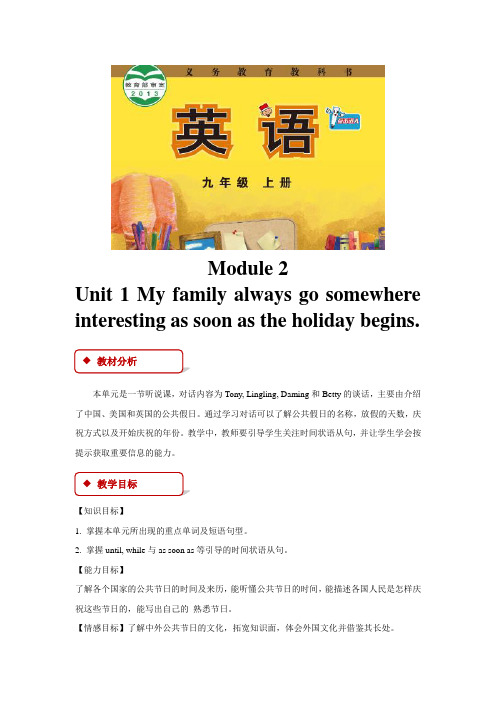
Module 2Unit 1 My family always go somewhere interesting as soon as the holiday begins.本单元是一节听说课,对话内容为Tony, Lingling, Daming和Betty的谈话,主要由介绍了中国、美国和英国的公共假日。
通过学习对话可以了解公共假日的名称,放假的天数,庆祝方式以及开始庆祝的年份。
教学中,教师要引导学生关注时间状语从句,并让学生学会按提示获取重要信息的能力。
【知识目标】1. 掌握本单元所出现的重点单词及短语句型。
2. 掌握until, while与as soon as等引导的时间状语从句。
【能力目标】了解各个国家的公共节日的时间及来历,能听懂公共节日的时间,能描述各国人民是怎样庆祝这些节日的,能写出自己的熟悉节日。
【情感目标】了解中外公共节日的文化,拓宽知识面,体会外国文化并借鉴其长处。
【教学重点】 1. 领会并灵活使用下列词汇短语found, flag, off, vacation,season, ninth, twelfth, since then, have one day off, all kindsof, take a vacation, as soon as, somewhere nice, have a three-day holiday.2. 掌握重点句型:We will stay there until the end of the holiday.While we are staying with our friends, we are going to spend one day in Qingdao.My family always goes somewhere interesting as soon as the holiday begins.3.理解并掌握until, while 与as soon as 等引导的时间状语从句。
外研版初中英语九年级上册教案:Module2 unit1
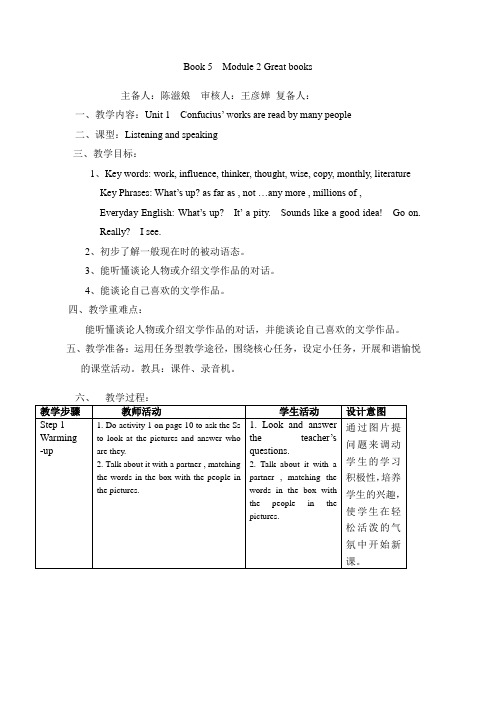
Book 5 Module 2 Great books主备人:陈滋娘审核人:王彦婵复备人:____________一、教学内容:Unit 1 Confucius’ works are read by many people二、课型:Listening and speaking三、教学目标:1、Key words: work, influence, thinker, thought, wise, copy, monthly, literatureKey Phrases: Wh at’s up? as far as , not …any more , millions of ,Everyday English: What’s up? It’ a pity. Sounds like a good idea! Go on.Really? I see.2、初步了解一般现在时的被动语态。
3、能听懂谈论人物或介绍文学作品的对话。
4、能谈论自己喜欢的文学作品。
四、教学重难点:能听懂谈论人物或介绍文学作品的对话,并能谈论自己喜欢的文学作品。
五、教学准备:运用任务型教学途径,围绕核心任务,设定小任务,开展和谐愉悦的课堂活动。
教具:课件、录音机。
达标训练题一、选择填空( )1. ____ I can see, it is a perfect plan.A. As long asB. As far asC. As far fromD. As well as( )2. We should love the young and ___ the old.A. respectB. likeC. hateD. influence()3.—Is Mr. Brown famous ____ his poems?—Yes, but he isn’t known ____ a great writer like his father.A. for; asB. as; forC. in; toD. to; in()4.—Do you think this book is ________ difficult for children to read?—Yes, I think so.A. a fewB. a bitC. a greatD. a small()5.—Did you watch the football game on TV?—Yes, I did. I think _____ people also watched it.A. several millionsB. millions ofC. two million ofD. two millions二、完成句子1. 我正在考虑从今开始打扫房间。
英语九年级上外研版module1:unit2教案(精品)
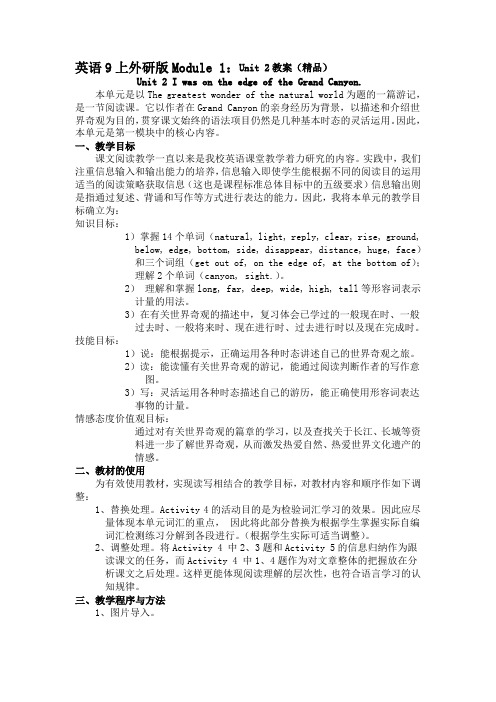
英语9上外研版Module 1:Unit 2教案(精品)Unit 2 I was on the edge of the Grand Canyon.本单元是以The greatest wonder of the natural world为题的一篇游记,是一节阅读课。
它以作者在Grand Canyon的亲身经历为背景,以描述和介绍世界奇观为目的,贯穿课文始终的语法项目仍然是几种基本时态的灵活运用。
因此,本单元是第一模块中的核心内容。
一、教学目标课文阅读教学一直以来是我校英语课堂教学着力研究的内容。
实践中,我们注重信息输入和输出能力的培养,信息输入即使学生能根据不同的阅读目的运用适当的阅读策略获取信息(这也是课程标准总体目标中的五级要求)信息输出则是指通过复述、背诵和写作等方式进行表达的能力。
因此,我将本单元的教学目标确立为:知识目标:1)掌握14个单词(natural, light, reply, clear, rise, ground, below, edge, bottom, side, disappear, distance, huge, face)和三个词组(get out of, on the edge of, at the bottom of);理解2个单词(canyon, sight.)。
2)理解和掌握long, far, deep, wide, high, tall等形容词表示计量的用法。
3)在有关世界奇观的描述中,复习体会已学过的一般现在时、一般过去时、一般将来时、现在进行时、过去进行时以及现在完成时。
技能目标:1)说:能根据提示,正确运用各种时态讲述自己的世界奇观之旅。
2)读:能读懂有关世界奇观的游记,能通过阅读判断作者的写作意图。
3)写:灵活运用各种时态描述自己的游历,能正确使用形容词表达事物的计量。
情感态度价值观目标:通过对有关世界奇观的篇章的学习,以及查找关于长江、长城等资料进一步了解世界奇观,从而激发热爱自然、热爱世界文化遗产的情感。
外研版九年级英语上模块二教案
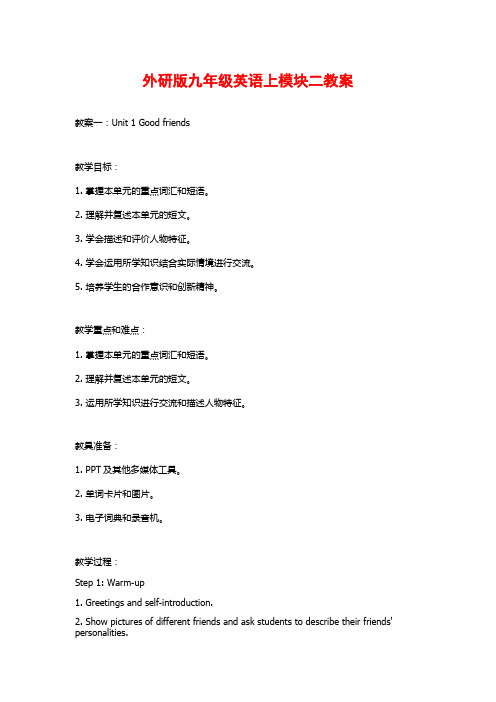
外研版九年级英语上模块二教案教案一:Unit 1 Good friends教学目标:1. 掌握本单元的重点词汇和短语。
2. 理解并复述本单元的短文。
3. 学会描述和评价人物特征。
4. 学会运用所学知识结合实际情境进行交流。
5. 培养学生的合作意识和创新精神。
教学重点和难点:1. 掌握本单元的重点词汇和短语。
2. 理解并复述本单元的短文。
3. 运用所学知识进行交流和描述人物特征。
教具准备:1. PPT及其他多媒体工具。
2. 单词卡片和图片。
3. 电子词典和录音机。
教学过程:Step 1: Warm-up1. Greetings and self-introduction.2. Show pictures of different friends and ask students to describe their friends' personalities.3. Discuss the qualities that make a good friend.Step 2: Presentation1. Show the flashcards of the new words and phrases in Unit 1.2. Introduce and explain the meaning and usage of each word/phrase.3. Use the words/phrase in a sentence and ask students to repeat.4. Play the audio recording of the words and phrases, ask students to listen and repeat.5. Practice the pronunciation and spelling of the words and phrases.Step 3: Reading and comprehension1. Divide the class into groups of four or five.2. Give each group a copy of the reading passage and ask them to read and discuss the questions.3. Have a class discussion to check the answers and clarify any misunderstandings.Step 4: Speaking and writing1. Ask students to imagine they are introducing their best friend to the class.2. In pairs, students take turns describing their friend's appearance, personality, hobbies, and interests.3. Students can use the new words and phrases they have learned.4. Have some students share their descriptions with the class.Step 5: Extension activities1. Give students a list of famous people and ask them to describe their personalities using the new words and phrases.2. Divide the class into small groups and ask each group to create a poster of a famous person, describing their personality and achievements.Step 6: Homework1. Review the new words and phrases from Unit 1.2. Write a short paragraph describing one of their friends, using the new words and phrases.3. Read a book or watch a movie about friendship and write a review.教案二:Unit 2 Healthy eating教学目标:1. 掌握本单元的重点词汇和短语。
2024年外研版九年级英语上册精彩教案Module1Unit21
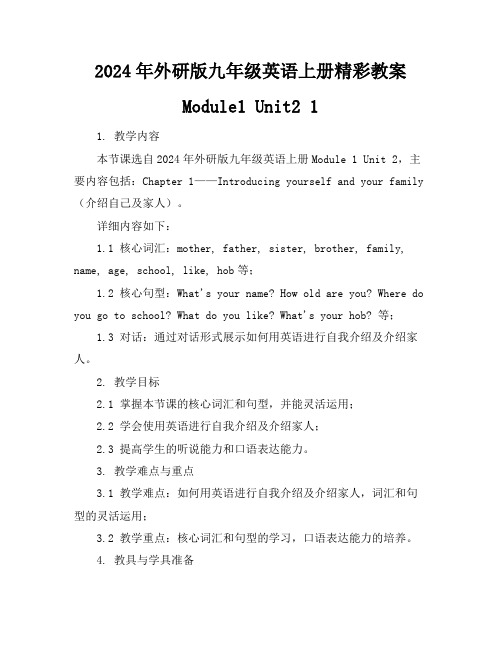
2024年外研版九年级英语上册精彩教案Module1 Unit2 11. 教学内容本节课选自2024年外研版九年级英语上册Module 1 Unit 2,主要内容包括:Chapter 1——Introducing yourself and your family (介绍自己及家人)。
详细内容如下:1.1 核心词汇:mother, father, sister, brother, family, name, age, school, like, hob等;1.2 核心句型:What's your name? How old are you? Where do you go to school? What do you like? What's your hob? 等;1.3 对话:通过对话形式展示如何用英语进行自我介绍及介绍家人。
2. 教学目标2.1 掌握本节课的核心词汇和句型,并能灵活运用;2.2 学会使用英语进行自我介绍及介绍家人;2.3 提高学生的听说能力和口语表达能力。
3. 教学难点与重点3.1 教学难点:如何用英语进行自我介绍及介绍家人,词汇和句型的灵活运用;3.2 教学重点:核心词汇和句型的学习,口语表达能力的培养。
4. 教具与学具准备4.1 教具:多媒体教学设备、黑板、教学卡片等;4.2 学具:学生用书、练习本、字典等。
5. 教学过程5.1 实践情景引入(5分钟)教师组织学生进行小组活动,要求每个小组成员用英语进行自我介绍,并向其他小组成员介绍自己的家人。
5.2 例题讲解(15分钟)教师通过多媒体展示对话,引导学生学习核心词汇和句型,并进行讲解。
5.3 随堂练习(15分钟)教师给出几个话题,要求学生运用所学词汇和句型进行口语练习,如:介绍自己的朋友、同学等。
5.4 小组讨论(10分钟)5.5 课堂小结(5分钟)6. 板书设计6.1 核心词汇:mother, father, sister, brother, family, name, age, school, like, hob等;6.2 核心句型:What's your name? How old are you? Where do you go to school? What do you like? What's your hob? 等;6.3 对话示例。
Module2Unit1导学案外研版英语九年级上册

Module 2Public holidays主题内容主题范畴:人与社会子主题:节假日与庆祝活动学习目标1.语言知识:掌握相关单词、短语和句子,并能够谈论中外重要节日和自己的节日计划。
2.文化知识:加深对中外节日文化的了解,增进对祖国传统文化的热爱。
3.语言技能:学习了解并掌握时间状语从句及其运用。
4.学习策略:了解中外重要节日,知道其来历和庆祝方式,并能理解其文化内涵。
Unit 1My family always go somewhere interesting as soon as the holiday begins.课前预习请预习下列重点单词、短语和句子,并完成下面的表格及相关训练。
重点单词名词1.旗;旗帜________•(短语)国旗________2.假期;假日________•(同义词) ________3.度假旺季;节期________•(n.) ________4.小孩________5.乐队________6.英国________•(全称) ________动词7.创立;创建________•(过去式/过去分词) ________数词8.第四________•第十四________•第四十________9.第六________•第十六________•第六十________10.第七________•第十七________•第七十________11.第八________•第十八________•第八十________12.第九________•第十九________•第九十________13.第十________14.第十二________•十二________15.第二十________•二十________副词16.不上课;休息;不工作________•(短语)休息三天______________兼词17.(prep.& conj.)直到……为止________根据语境或提示,完成填空。
Module1Unit2外研版英语九年级上册单元教案
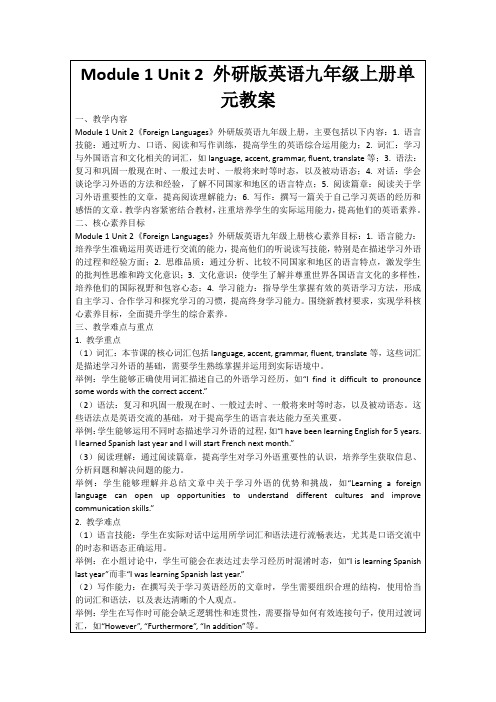
3.重点难点解析:在讲授过程中,我会特别强调时态和语态的正确运用以及跨文化交际的重要性。对于难点部分,我会通过实际语境和比较来帮助大家理解。
(三)实践活动(用时10分钟)
1.分组讨论:学生们将分成若干小组,每组讨论一个与学习外语相关的问题,如如何提高口语流利度。
三、教学难点与重点
1.教学重点
(1)词汇:本节课的核心词汇包括language, accent, grammar, fluent, translate等,这些词汇是描述学习外语的基础,需要学生熟练掌握并运用到实际语境中。
举例:学生能够正确使用词汇描述自己的外语学习经历,如“I find it difficult to pronounce some words with the correct accent.”
2.引导与启发:在讨论过程中,我将作为一个引导者,帮助学生发现学习中的问题、分析问题并找到解决策略。
3.成果分享:每个小组将选择一名代表来分享他们的讨论成果,包括学习方法的总结和改进建议。
(五)总结回顾(用时5分钟)
今天的学习,我们了解了学习外语的重要性、词汇和语法的核心概念,以及如何在实际中应用这些知识。通过实践活动和小组讨论,我们加深了对学习外语方法的理解。我希望大家能够掌握这些知识点,并在日常生活中不断实践。如果有任何疑问或不明白的地方,请随时向我提问。
(2)写作能力:在撰写关于学习英语经历的文章时,学生需要组织合理的结构,使用恰当的词汇和语法,以及表达清晰的个人观点。
举例:学生在写作时可能会缺乏逻辑性和连贯性,需要指导如何有效hermore”, “In addition”等。
(3)跨文化意识:理解并尊重不同国家和地区的语言文化差异,这要求学生在掌握语言知识的基础上,具备一定的文化背景知识。
外研版九年级英语上册教案Module1Unit21

外研版九年级英语上册教案 Module1 Unit21一、教学内容本节课选自外研版九年级英语上册 Module 1 Unit 2,主要内容包括:1. 知识目标:掌握表示过去的动词时态,了解并运用一般过去时描述过去发生的事情;2. 语言技能:通过听力、口语、阅读和写作练习,提高学生的英语综合运用能力;3. 文化意识:了解不同国家的文化背景,增进跨文化交际意识。
二、教学目标1. 能够理解并运用一般过去时描述过去发生的事情;2. 能够通过听力、口语、阅读和写作练习,提高英语综合运用能力;3. 增进对跨文化交际的认识,培养合作学习的意识。
三、教学难点与重点1. 教学难点:一般过去时的运用,动词过去式的变化;2. 教学重点:通过听力、口语、阅读和写作练习,让学生熟练掌握一般过去时。
四、教具与学具准备1. 教具:录音机、投影仪、黑板、教鞭;2. 学具:英语课本、练习册、笔记本、文具。
五、教学过程1. 导入:通过展示一组关于世界各国文化的图片,引发学生对跨文化交际的兴趣,为新课学习做好铺垫。
2. 新课展示:呈现课文内容,引导学生关注一般过去时的运用,讲解动词过去式的变化规则。
3. 听力练习:播放课文录音,让学生回答与课文相关的问题,检测学生对一般过去时的理解。
4. 口语练习:分组进行角色扮演,让学生运用一般过去时描述过去发生的事情,提高口语表达能力。
5. 阅读理解:引导学生阅读课文,完成相应的阅读理解练习,巩固对一般过去时的认识。
6. 写作练习:让学生运用一般过去时写一篇关于自己过去经历的短文,提高写作能力。
六、板书设计1. Module 1 Unit 22. 主要内容:a. 一般过去时b. 动词过去式变化规则c. 口语、听力、阅读、写作练习七、作业设计1. 作业题目:a. 用一般过去时描述你上个周末的经历;b. 根据课文内容,回答相关问题。
2. 答案:见课后练习答案。
八、课后反思及拓展延伸1. 反思:关注学生在课堂上的表现,及时发现问题,调整教学方法,提高教学效果。
外研社初中英语九年级上册Module 1 Wonders of the world Unit2 学案

外研社初中英语重点知识精选掌握知识点,多做练习题,基础知识很重要!外研社版初中英语和你一起共同进步学业有成!at the bottom2. Most of leaves fell down the ground. Only a few r_____ on the tree.3. The fog has c_______ slowly and the sun is s__________ again.6. Please don’t write b_______ this line.7. We asked him the way to the hospital, but he didn’t r_______.8. It’s getting dark. It’s n_______ eight o’clock in the evening.二、选择填空) 2. ---________ will he come back?--- In two hours.A.C. How oftenC. below) 4. He didn’t say a word and got _____ a taxi angrily.A. meetB. giveC. riseD. faceA. there will haveB. there is going to be语法专练1. --- I’d like to introduce my best friend to you, Tom.2. --- Excuse me. Look at the sign NO PHOTOS!3. Listen to the girls by the windows. What language ______?4. --- What will you do if it ______ tomorrow?C.--- Next Friday. When it ______, I’ll call you.A. begins; begins9. Our math teacher ________in our school since he______ here.A. has taught; has come外研社版初中英语相信自己,就能走向成功的第一步教师不光要传授知识,还要告诉学生学会生活。
外研版英语九年级上册(教学设计)Module 1 Unit 2

Module 1 Wonders of the worldUnit 2 The Grand Canyon was not just big.教材分析This is the second lesson in this module. The reading material is information about wonders. It’s a good text to help the students improve their reading strategies, such as getting information from the reading material about the wonder.教学目标【知识目标】1. Key words: natural, light, reply, rock, clear, rise –rose-risen, ground, below, edge, bottom , canyon, top, disappear,2. Key phrases: get out of; look over, on the edge of, at the bottom of【能力目标】To get information of wonders in the world.【情感目标】Learn to respect nature ..Learn to write about wonders in the right way.教学重难点【教学重点】Learn the key words.【教学难点】Learn to understand the passage about wonders.Learn to write a passage about wonders in the world.课前准备Multimedia教学过程Step I. Warm-up1. Know about wonders of the world and some adjectives about them.T shows some pictures to introduce wonders of the world: the Eiffel Tower(modern, tall), Niagara Falls (natural, deep ,wide), The Amazon River (natural, long, wide), Mount Qomolangma (natural, high), Mount Huang (natural)【设计意图】用图片直观引入世界各地的景观,为本课做铺垫。
外研版九年级英语上册教案 Module2 Unit1
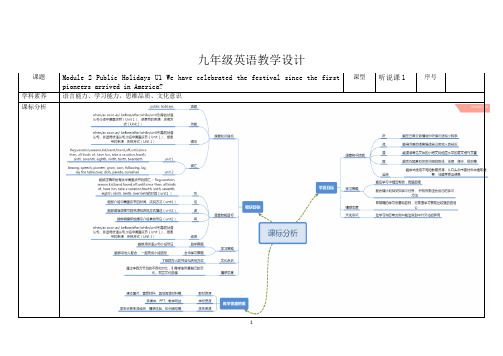
九年级英语教学设计课型听说课1序号课题Module 2 Public Holidays U1 We have celebrated the festival since the firstpioneers arrived in America?学科素养语言能力、学习能力,思维品质、文化意识课标分析1教材分析学情分析学习目标(学习活动+学习主体+(行为程度)+评价活动)1.通过看音标读、看单词读,在小组合作和同桌互助下90%的学生能准确读出本模块目标单词,其他同学能在同学和老师的帮助下拼读单词。
2.通过听前说情境中对话练习85%的学生能用句型和日期描述节日。
其他同学能在同学和老师的帮助下完成任务。
3.通过听听力素材、听力文本85%的同学能运用听前预测、听中抓取关键词等已有的听力策略,获取目标单词并整合信息完成听力任务,其他同学能听出关键词并能理解文本大意。
通过听力文本处理,让学生对比中国和美国的国庆节。
4.通过听前说关于假期的对话练习、听中说的文本复述、学以致用的小组合作.85%的学生能熟练介绍我们国家的节日。
其他同学能在同学和老师的帮助下能完成。
232.听前说2.通过听前说情境中对话练习85%的学生能用句型描述节日。
其他同学能在同学和老师的帮助下完成任务。
(目标2和4)通过句型,学生先介绍一下节日的相关内容抽查两组学生朗读句子。
评价标准:1.单词发音准确。
2.句子朗读流畅。
朗读时能注意感官动词的重读问题。
3.小听力85%的同学抓取关键词并填写信息。
其他同学能在同学和老师帮助下完成。
(目标3)中国的Labour Day、英国的 MayDay和美国的Labour Day是哪一天听听力,写出不同国家的节日的时间完成相应的听力任务。
并朗读这些句子4.听中学85%的同学通过多层听获取细节信息,抓取关键词并整合信息。
其他同学能在同学和老师帮助下填出3-5个关键词。
(目标3)80%同学能根据关键词提示复述对话内容。
完整版本外研版本初中英语初中九年级的上册的学习教案:Module1unit2.doc
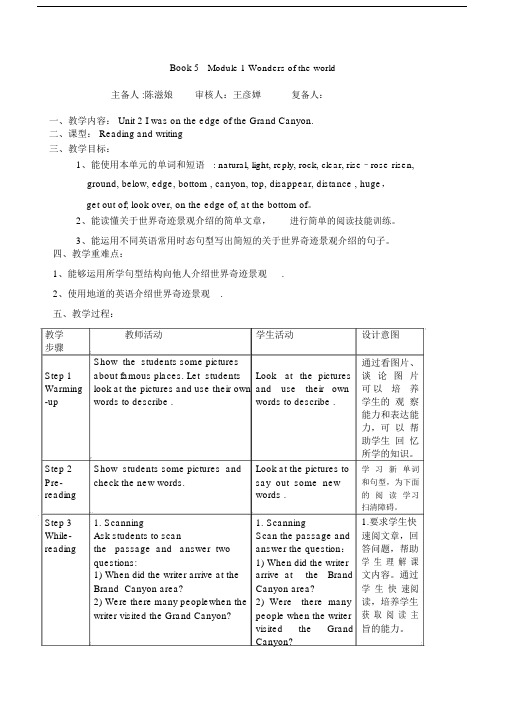
Book 5Module 1 Wonders of the world主备人 :陈滋娘审核人:王彦婵复备人:____________一、教学内容: Unit 2 I was on the edge of the Grand Canyon.二、课型: Reading and writing三、教学目标:1、能使用本单元的单词和短语: natural, light, reply, rock, clear, rise–rose-risen,ground, below, edge, bottom , canyon, top, disappear, distance , huge,get out of; look over, on the edge of, at the bottom of。
2、能读懂关于世界奇迹景观介绍的简单文章,进行简单的阅读技能训练。
3、能运用不同英语常用时态句型写出简短的关于世界奇迹景观介绍的句子。
四、教学重难点:1、能够运用所学句型结构向他人介绍世界奇迹景观.2、使用地道的英语介绍世界奇迹景观.五、教学过程:教学教师活动学生活动步骤Show the students some picturesStep 1 about famous places. Let students Look at the pictures Warming look at the pictures and use their own and use their own -up words to describe . words to describe .Step 2 Show students some pictures and Look at the pictures to Pre- check the new words. say out some new reading words . 设计意图通过看图片、谈论图片可以培养学生的观察能力和表达能力,可以帮助学生回忆所学的知识。
外研版英语九上Module2Unit1学案
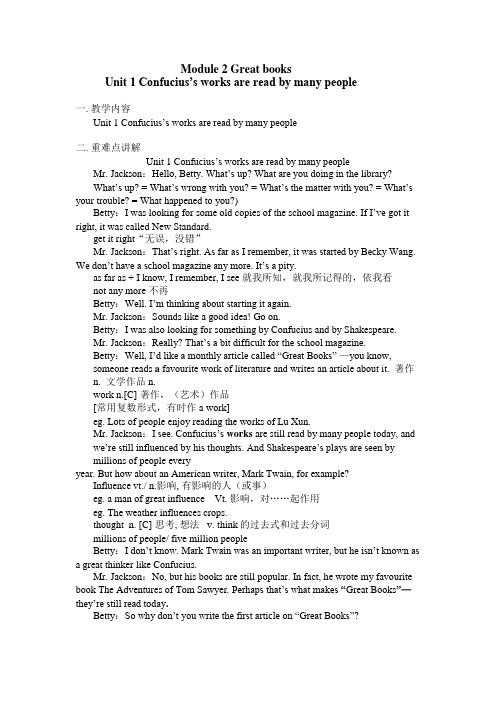
Module 2 Great booksUnit 1 Confucius’s works are read by many people一. 教学内容Unit 1 Confucius’s works are read by many people二. 重难点讲解Unit 1 Confucius’s works are read by many peopleMr. Jackson:Hello, Betty. What’s up? What are you doing in the library?What’s up? = What’s wrong with you? = What’s the matter with you? = What’s your trouble? = What happened to you?)Betty:I was looking for some old copies of the school magazine.If I’ve got it right, it was called New Standard.get it right“无误,没错”Mr. Jackson:That’s right. As far as I remember, it was started by Becky Wang. We don’t have a school magazine any more. It’s a pity.as far as + I know, I remember, I see 就我所知,就我所记得的,依我看not any more 不再Betty:Well. I’m thinking about starting it again.Mr. Jackson:Sounds like a good idea! Go on.Betty:I was also looking for something by Confucius and by Shakespeare.Mr. Jackson:Really? That’s a bit difficult for the school magazine.Betty:Well, I’d like a monthly article called “Great Books” —you know,someone reads a favourite work of literature and writes an article about it. 著作n. 文学作品n.work n.[C] 著作,(艺术)作品[常用复数形式,有时作a work]eg. Lots of people enjoy reading the works of Lu Xun.Mr. Jackson:I see. Confucius’s works are still read by many people today, and we’re still influenced by his thoughts. And Shakespeare’s plays are seen bymillions of people everyyear. But how about an American writer, Mark Twain, for example?Influence vt./ n.影响, 有影响的人(或事)eg. a man of great influence Vt. 影响,对……起作用eg. The weather influences crops.thought n. [C] 思考, 想法 v. think的过去式和过去分词millions of people/ five million peopleBetty:I don’t know. Mark Twain was an important writer, but he isn’t known as a great thinker like Confucius.Mr. Jackson:No, but his books are still popular. In fact, he wrote my favourite book The Adventures of Tom Sawyer.Perhaps that’s what makes“Great Books”—they’re still read today.Betty:So why don’t you write the first article on “Great Books”?【典型例题】1. “ Hi, Tom. _______(怎么了)Why are you crying? ” “I hurt my left leg.”2. There are four ______(名著)in Chinese literature.3. _________(就……而言)I know, he has been to Beijing twice.4. It is 5:00 p.m.; we will _______(不再)wait for him.5. _______(数百万计)Beijingers are learning English.答案:1. What’s up?2. works3. As far as4. not any more5. Millions of内容总结(1)What’s up。
- 1、下载文档前请自行甄别文档内容的完整性,平台不提供额外的编辑、内容补充、找答案等附加服务。
- 2、"仅部分预览"的文档,不可在线预览部分如存在完整性等问题,可反馈申请退款(可完整预览的文档不适用该条件!)。
- 3、如文档侵犯您的权益,请联系客服反馈,我们会尽快为您处理(人工客服工作时间:9:00-18:30)。
九年级英语上册Module 2导学案
Unit 1
【课前朗读】
found, since then, vacation, while, as soon as, Labour Day (国际劳动节),Independence Day (独立日)
【学习目标】
知识与技能:了解中国国庆节和美国独立日的相关情况;能够正确的表达日期;理解并掌握时间状语从句的用法。
过程与方法:通过自主互助合作的方法,借助听力练习来解决问题。
情感态度价值观:了解别国的节日,加深对中国节日文化的了解。
【学习重难点】
理解并学会运用由as soon as, since, until, while, when 等连接的状语从句。
【学习过程】
Step 1 导入新课:
Boys and girls, do you like festivals? Can you tell me something about Chinese festivals? Ask some students to answer the questions.
Step 2 对话处理:
1. Listen for the first time and check T or F.
(1) The first of October is China’s National Day. ( )
(2) In the UK, people celebrate Christmas with a two-day holiday. ( )
2. Listen for the 2nd time and answer the four questions.
(1) When is the Independence Day of America?
A. July 4th
B. July 14th
C. July 20th
(2) How do Americans celebrate the Independence Day?
A. American flags are everywhere & bands play music
B. They usually have a picnic somewhere nice.
C. Both A &B
Step 3 读后说
1. Read the dialogue by yourselves and act out the dialogue (work in pairs).
2. Complete the table (Activity 3).
Step4 知识点拨
1.…. we only have one day off.
day off意思是“休息日,休假日”,通常指工作日的时候请假。
2. Is there anything special on that day?
We usually have a picnic somewhere nice.
anything special and somewhere nice 中的special and nice 为形容词,在修饰有some, any, every, no 等构成的复合不定词时,须后置。
3. Kids have great fun.
have fun= enjoy oneself = have a great/good time . 享受某种气氛或所做事情;玩得高兴
4. on +具体时间,on 4th July; in+不具体的时间in July.
5. as soon as 意为“一......就......”在其引导的时间状语从句的复合句中,主句用一般将来时,从句用一般现在时代替将来。
即“主将从现”原则。
Eg. I will tell him the news as soon as he comes back.
Step 5. 学以致用
一、根据给出的汉意提示用单词的正确形式完成
1. Most people take a _________ (假期) sometime in July or August.
2. How do you (庆祝) the Spring Festival?
3. What do they do anything (特殊的,特别的) on Independence Day?
4. We will stay there (直到) May 5th.
5. Mr. Li (创立) a green school in 2013.
6. There are four (季节) in a year, they are spring, summer, autumn and winter.
二、选择题
1. --- I have something important to tell Mr. Green.
--- Don’t worry. I’ll call you _____ he comes back.
A. when
B. how
C. why
D. while
2. My father didn’t go to bed ____ he finished the work.
A. before
B. after
C. when
D. until
3. I think he’ll call you up as soon as he ____ Hangzhou.
A. get to
B. will arrive
C. will reach
D. reaches
4. They were playing basketball ____ I left.
A. when
B. while
C. before
D. after
5. They want to go for their holidays.
A. warm somewhere
B. somewhere warm
C. anywhere warm
D. everywhere warm
三、用所给单词的正确形式完成句子.
1. We have fun (play) in the wter.
2. He went to Turkey in 1956 and (live) there since then.
3. While I (read), my mother was washing clothes.
4. I have something important (tell) you.
5. The students stopped (talk) when the teacher came in.
6. I watched her (go) out of the room just now.
四、根据提示翻译句子。
1. 它是个公共假期,但我们只放一天假。
(one day off)
________________________________________________.
2. 孩子们玩得很开心,我们也会在公园里观看乐队演奏音乐。
(watch)
_________________________________________________________.
3. 当假期一开始,我一家人就总是到有趣的地方去。
(as soon as)
____________________________________________________________.
4. 它是假期季节的开始,大部分人会在七月或八月的某个时间去度假。
(take a vacation)
_____________________________________________________________.
5. 当和我们的朋友呆在一起的时候,我们打算在青岛度过一天时间。
(stay with)
_____________________________________________________________.
Module 2 答案
Unit 1
Step2 1. T T 2. A C
Step 5
一 1. vacation 2. celebrate 3. special 4. until 5. founded 6. seasons 二ADDAB
三 1. playing 2. has lived 3. was reading 4. to tell 5.talking 6. go 四略。
